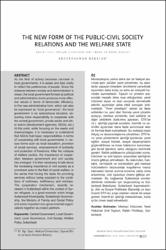| dc.contributor.author | Babacan, Abdurrahman | |
| dc.date.accessioned | 2021-01-26T07:59:24Z | |
| dc.date.available | 2021-01-26T07:59:24Z | |
| dc.date.issued | 2018 | en_US |
| dc.identifier.citation | Babacan, A. (2018). The new form of the public-civil society relations and the welfare state. The Journal of Conservative Thought, 1(53), 301-315. | en_US |
| dc.identifier.issn | 1304-8864 | |
| dc.identifier.uri | https://hdl.handle.net/20.500.12511/6391 | |
| dc.description.abstract | As the field of activity becomes narrower in local governments, it is easier and less costly to reflect the preferences of people. Since the distance between society and administration is closer, the local government formed qt political and administrative levels produces more effective results in terms of democratic efficiency. In this new administrative form, which can also be expressed as “local governance”, the local government in an autonomous structure, assuming more responsibility to cooperate with the central government, private sector and other actors (development agencies, NGOs, etc.) At this point, while focusing on the needs and disadvantages, it is necessary to understand that NGOs hold basic responsibilities in terms of cooperating with local governments in various forms such as local education, provision of social services, empowerment of solidarity and protection of freedoms. After the collapse of welfare politics, the importance of cooperation between government and civil society has emerged. It is then necessary to talk about the increasing importance of civil society as a prominent actor in the field of social welfare, in the sense that having the basis for providing services without being exposed to the conditions of bulkiness, inefficiency and red-tape. The cooperation mechanism, recently revealed in Sultanbeyli within the context of Syrian refugees, is a good example which brings Sultanbeyli Municipality, Sultanbeyli Governorship, the Ministry of Family and Social Policy and some important non-governmental organizations together as project partners. | en_US |
| dc.description.abstract | Merkezileşme yerine daha dar bir faaliyet alanında işlev yürüten yerel yönetimler, bu alanlarda yaşayan bireylerin tercihlerini yansıtmak açısından daha kolay ve daha az maliyetli hizmetler sunmaktadır. Toplum ve yönetim arasındaki mesafe daha kısa olduğundan, yerel hükümet siyasi ve idari seviyede demokratik etkinlik açısından daha etkili sonuçlar üretmektedir. “Yerel yönetişim” olarak da ifade edilebilen bu yeni idari formda yerel yönetim anlayışı, merkezi yönetimle, özel sektörle ve diğer aktörlerle (kalkınma ajansları, STK’lar vb.) işbirliği yapmak suretiyle, özerklik ve verimlilik açısından daha fazla sorumluluk alan bir formda ifade bulmaktadır. Bu noktada insan ihtiyaç ve dezavantajlarına yönelirken, STK’ların yerel yönetimlerle işbirliği içerisinde, yerel eğitim, sosyal hizmet, sosyal dayanışmanın güçlendirilmesi ve insan haklarının korunması gibi temel işlevlere sahip olduğunu belirtmek gerekir. Refah politikasının çöküşünden sonra, hükümet ve sivil toplum arasındaki işbirliğinin önemi gittikçe artmaktadır. Bu bakımdan, hantallık, verimsizlik ve bürokratizm gibi merkezi hükümetlerin dezavantajlı koşullarına maruz kalmadan hizmet sunma temeline sahip olma anlamında, sivil toplumun önemi gittikçe artmaktadır. Bu bağlamda Sultanbeyli sınırları dâhilinde mülteciler için oluşturulmuş ve Sultanbeyli Belediyesi, Sultanbeyli Kaymakamlığı, Aile ve Sosyal Politikalar Bakanlığı ve bazı önemli STK’ları proje ortakları olarak bir araya getiren önemli bir işbirliği mekanizması, buna iyi bir örnek teşkil etmektedir. | en_US |
| dc.language.iso | eng | en_US |
| dc.publisher | Orient Yayıncılık Reklamcılık Bilgisayar Araştırma | en_US |
| dc.rights | info:eu-repo/semantics/openAccess | en_US |
| dc.subject | Central Government | en_US |
| dc.subject | Local Government | en_US |
| dc.subject | Local Governance | en_US |
| dc.subject | Civil Society | en_US |
| dc.subject | Welfare Policy | en_US |
| dc.subject | Sultanbeyli | en_US |
| dc.subject | Merkezi Hükümet | en_US |
| dc.subject | Yerel Hükümet Sivil Toplum | en_US |
| dc.subject | Refah Politikası | en_US |
| dc.subject | Sultanbeyli | en_US |
| dc.title | The new form of the public-civil society relations and the welfare state | en_US |
| dc.title.alternative | Devlet sivil toplum ilişkisinin yeni formu ve refah devleti | en_US |
| dc.type | article | en_US |
| dc.relation.ispartof | The Journal of Conservative Thought | en_US |
| dc.department | İstanbul Medipol Üniversitesi, İnsan ve Toplum Bilimleri Fakültesi, Siyaset Bilimi ve Kamu Yönetimi Bölümü | en_US |
| dc.authorid | 0000-0003-4703-1085 | en_US |
| dc.identifier.volume | 1 | en_US |
| dc.identifier.issue | 53 | en_US |
| dc.identifier.startpage | 301 | en_US |
| dc.identifier.endpage | 315 | en_US |
| dc.relation.publicationcategory | Makale - Ulusal Hakemli Dergi - Kurum Öğretim Elemanı | en_US |


















